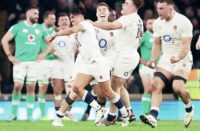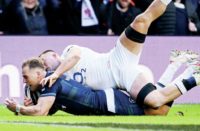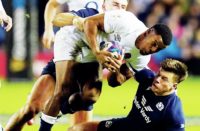
Following last week's defeat the headlines in almost every paper was about the reality check that England had faced when playing against the team ranked just above them in the IRB world rankings – South Africa.
Why was it a surprise – or a reality check – that England lost?
Since Stuart Lancaster has taken over as head coach there has been a refreshing honesty about the England team.
Yes, there has been the usual work in progress, developing a squad for the World Cup in three years'; but this time it is actually true.
Mostly, when a new management team are appointed it takes a long time before major changes are made to the players within the squad (if at all) with the mantra about building a squad always wheeled out to give the coaches time to get there collective feet under the table and get the team playing in the style they want.
This time it is different, because of Lancaster's previous role within the Union he has been able to bring in a number of new faces both on the coaching and playing front which has really made this a true development squad for probably next season's Six Nations and the tour beyond.
Although Lancaster was not a popular choice as far as the media were concerned, since stepping in first as a gap filler and now as permanent manager/head coach, results have been surprising but not spectacular.
A reasonable Six Nations silenced most of the media objections to his appointment but there is still an undercurrent of those who feel he is not qualified for the job and are waiting for the team to fail.
Looking at the headlines last week you would have thought that England had been on the end of a rout.
“Harsh facts of life for Lancaster”, “England's hopes go south”, “England overpowered” are just some of them. But the reality was much different, England lost by just five points not 50 and by doing so would have told Lancaster and his coaches a lot about the young players they had chosen.
The team may well lose by more points – but they will improve as a squad which will enable Lancaster to pick his new Elite Playing Squad this autumn with a knowledge of his players that he would not have had before this tour.
Success on this tour is about those players that show they are capable of stepping up a level and learning what it takes to compete with the different challenges that facing the SANZA teams in their own backyard, which is far harder than playing them at Twickenham.
As much as the team will want to win and Lancaster will talk about winning and, as hard as it is for me to say because I always want England to be the best, the truth is that this tour is not about winning it is about building a squad that will win at the 2015 RWC in England.
Since the creation of the RWC, rugby has moved in a four-year cycle with the World Cup being the obvious target for all the major nations, even though the fact remains that there are still only five probable winners.
Unlike players who, if they make the grade as internationals will have a two RWC career, coaches know that they are likely to have only one crack at it.
It has generally been the case that after a World Cup the management and coaches are replaced, win or lose.
If you lose it is to bring a fresh approach and new ideas that must have time to bed-in before the next RWC. If you win the head coach will (if he has any sense at all) step down remembering that old adage, “you're only as good as your last game” so either way not many coaches are given a second shot which, given the evidence of those that have, could be a little short- sighted on the part of the Unions.
In England of all the managers/head coaches that have taken the team to a World Cup only Clive Woodward was retained following his team's failure in 1999 and we all know what happened in 2003. Was it the opportunity to put right the many mistakes that were made going into 1999 that led to the win in 2003?
Graham Henry's New Zealand lost in France 2007 because they did not have enough strength in depth at fly-half but won in 2011 with a fourth choice 10 (Stephen Donald) on the field in the final, having lost Dan Carter to injury earlier in the competition .
History says that even if Lancaster lasts until the next World Cup which, given some of the RFU's previous decisions is not a guarantee, he is unlikely to be given another shot should the team fail.
That means that Lancaster knows he has a window where close defeats and good and improving performances will be enough to satisfy the sceptics as he prepares his squad and coaching team to take England forward to 2015.
Lancaster knows that this is his time and losing a series in South Africa this year is a price worth paying for a win in 2015.

























